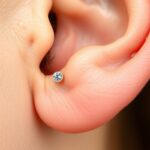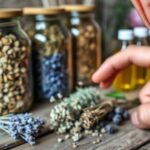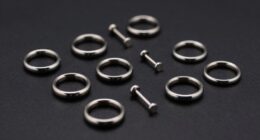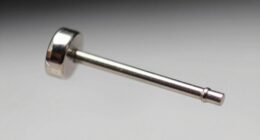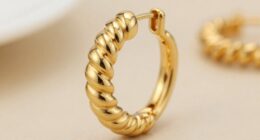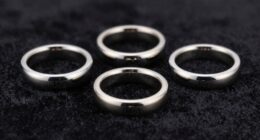A strong immune system helps your piercing heal faster and prevents complications like infections. Make sure to include nutrients like vitamins C and E, zinc, and stay well-hydrated to boost your body’s defenses and support tissue repair. Eating anti-inflammatory foods like leafy greens and fatty fish can also reduce swelling and promote healing. Taking good care of your overall health creates a solid foundation for smooth recovery—continue to explore tips that can help you heal more effectively.
Key Takeaways
- Adequate intake of vitamins C and E, zinc, and antioxidants boosts immune function and promotes faster piercing healing.
- Staying well-hydrated supports tissue repair, flushes out toxins, and reduces inflammation at the piercing site.
- Consuming anti-inflammatory foods like leafy greens, berries, and fatty fish helps lower inflammation and enhances immune response.
- Proper nutrition strengthens the skin’s barrier, reducing bacterial invasion and infection risk during healing.
- Good lifestyle habits such as sufficient sleep and stress management optimize immune resilience and support healing processes.

When you get a new piercing, your immune system plays a essential role in ensuring it heals properly. A strong immune response helps ward off piercing infections, which are common concerns during the healing process. If your immune system isn’t functioning at its best, you’re more likely to experience redness, swelling, or even more serious infections that can delay healing or cause complications. That’s why supporting your immune system through proper nutrition is necessary when you have a new piercing.
Your immune response relies heavily on the nutrients you consume daily. Vitamins like C and E boost your immune defenses by promoting the production of white blood cells, which are key for fighting off bacteria that might cause piercing infections. Vitamin C, found in citrus fruits, strawberries, and bell peppers, helps strengthen your skin’s barrier, making it less susceptible to bacterial invasion. Vitamin E, present in nuts and seeds, acts as an antioxidant, reducing inflammation and supporting tissue repair. Zinc, another essential mineral, plays a major role in wound healing and immune function. You can find zinc in foods like lean meats, shellfish, legumes, and whole grains. Ensuring adequate intake of these nutrients helps your body respond swiftly to any potential threats around your new piercing site.
Hydration also plays a critical role in maintaining a healthy immune response. Water keeps your tissues hydrated, flushes out toxins, and supports the delivery of nutrients to your cells. When you’re dehydrated, your immune system becomes less efficient, increasing the risk of infection and prolonging healing time. Drinking enough water daily helps maintain ideal immune function and keeps swelling and inflammation in check.
Another important aspect is avoiding inflammatory foods that could impair your immune response. Excess sugar, processed foods, and refined carbs can lead to increased inflammation, making it harder for your body to fight off bacteria and repair tissue. Instead, focus on consuming anti-inflammatory foods like leafy greens, berries, fatty fish rich in omega-3 fatty acids, and olive oil. These foods support your immune system and promote quicker healing.
Finally, don’t forget that habits like getting enough sleep, managing stress, and practicing good hygiene are essential for a strong immune response. When your immune system is functioning at its best, you’re less likely to develop piercing infections and more likely to heal smoothly. Nourishing your body with the right nutrients creates a resilient foundation for your immune system to protect and repair your skin, ensuring your piercing heals beautifully and without complications.
Frequently Asked Questions
How Does Stress Impact Piercing Healing?
Stress can slow down your piercing healing process by weakening your immune system. When you’re stressed, your body produces more cortisol, which hampers immune support and delays tissue repair. To promote faster healing, focus on stress management techniques like relaxation exercises and proper nutrition. Maintaining a strong immune system helps your body fight off infections and supports tissue regeneration, ensuring your piercing heals smoothly and quickly.
Are There Specific Supplements That Speed up Healing?
Think of supplements as your healing allies, providing specific benefits that act as healing enhancers. You might consider vitamin C for collagen production, zinc to support immune function, and biotin for skin repair. These supplements boost your body’s natural healing process, helping your piercing recover faster. Always consult with a healthcare professional before adding new supplements to your routine, but these targeted options could make a real difference in your healing journey.
Can Certain Foods Cause Allergic Reactions Around Piercings?
Certain foods can trigger allergic reactions or food sensitivities around piercings. Common allergy triggers include nuts, shellfish, and dairy, which may cause redness, swelling, or irritation near your piercing. You should be cautious about consuming these foods if you notice any adverse reactions. Keeping track of your diet helps identify potential allergy triggers, so you can avoid foods that might worsen your piercing’s healing process.
How Does Hydration Influence Immune Response During Healing?
They say, “You are what you drink,” and staying hydrated directly influences your healing. Proper hydration levels boost immune function, helping your body fight off infection and reduce inflammation around your piercing. When you’re well-hydrated, your immune response becomes more efficient, promoting quicker healing. So, drink plenty of water daily—it’s a simple yet powerful way to support your body’s natural defenses and ensure your piercing heals smoothly.
What Are the Signs of a Compromised Immune System Affecting Healing?
If your immune system is compromised, you might notice slow healing, persistent redness, swelling, or unusual pain around your piercing. You could also experience frequent infections or develop pus. An immune deficiency reduces your body’s ability to fight off bacteria, increasing infection risk and delaying recovery. If these signs appear, it’s essential to consult a healthcare professional to prevent further complications and support your healing process effectively.
Conclusion
By nourishing your body with the right nutrients, you’re giving your immune system the tools it needs to work like a skilled gardener—tending to your piercing and helping it flourish. Remember, a strong immune system is the shield that protects your body from setbacks, turning healing into a smooth journey. So, stay mindful of what you eat, and watch your body’s natural defenses turn your piercing into a shining example of health and resilience.






